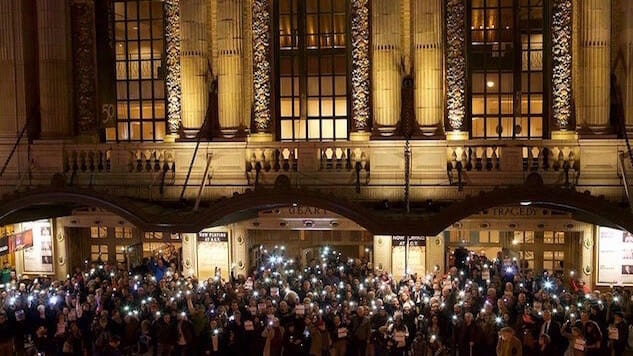The Ghostlight Project: How a New Wave of Theatre Activism Was Born
Julie Schuchard
On November 20, the cast of Hamilton broke the fourth wall and entreated one audience member, Vice President-elect Mike Pence, to embrace “diverse America.” Trump was offended. Others snickered at Pence’s supposed humiliation at the hands of the Tony-winning performers. Pence accepted the message gracefully (only to support a rollback back of transgender rights, a controversial immigration ban and the reinstatement of the Dakota Access Pipeline).
For a handful of theatrical designers, writers and producers, the Hamilton incident served as evidence of a budding power. Perhaps the theatre—with its creativity, energy, and ability to attract diverse audiences to a singular spot—has a genuine place in activism.
Thus, The Ghostlight Project was born. A crack team of theater legends like playwright Moisés Kaufman (The Laramie Project), director Rachel Chavkin (Natasha, Pierre and the Great Comet of 1812) and writer David Henry Hwang (M. Butterfly) cooked up a name, a logo, and a launch event on January 19, the eve of Trump’s inauguration. At 5:30 p.m. that evening, Ghostlight herded over a thousand theater people in Times Square, including actors Sally Field and Kate Mulgrew (Orange is the New Black).
At the same time, over 800 theatres across the country launched their own respective actions. From New York to California to South Bend, Indiana, the theater world was united and woke, maybe for the first time in history.
“As a theatre community we don’t really do things,” said Broadway set designer and Ghostlight’s lead organizer David Zinn (Fun Home). “We go to Tony Award parties. We don’t band together as a group over anything.”
Zinn was surprised by the thoroughly national response. “Who knew that Fort Collins, Colorado had nine theaters?” he said. “I realized I’ve been guilty of prejudice. It’s wonderful to be reminded that these smaller places have theater as a vital place to tell stories and come together.”
-

-

-

-

-

-

-

-

-

-

-

-

-

-

-

-

-

-

-

-

-

-

-

-

-

-

-

-

-

-

-

-

-

-

-

-

-

-

-

-








































